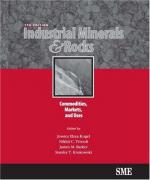|
This section contains 1,590 words (approx. 6 pages at 300 words per page) |

|
Industrial minerals is a term used to describe naturally occurring non-metallic minerals that are used extensively in a variety of industrial operations. Some of the minerals commonly included in this category include asbestos, barite, boron compounds, clays, corundum, feldspar, fluorspar, phosphates, potassium salts, sodium chloride, and sulfur. Some of the mineral mixtures often considered as industrial minerals include construction materials such as sand, gravel, limestone, dolomite, and crushed rock; abrasives and refractories; gemstones; and lightweight aggregates.
Asbestos is a generic term used for a large group of minerals with complex chemical composition that includes magnesium, silicon, oxygen, hydrogen, and other elements. The minerals collectively known as asbestos are often sub-divided into two smaller groups, the serpentines and amphiboles. All forms of asbestos are best known for an important common property—their resistance to heat and flame. That property is responsible, in fact, for the name asbestos...
|
This section contains 1,590 words (approx. 6 pages at 300 words per page) |

|


